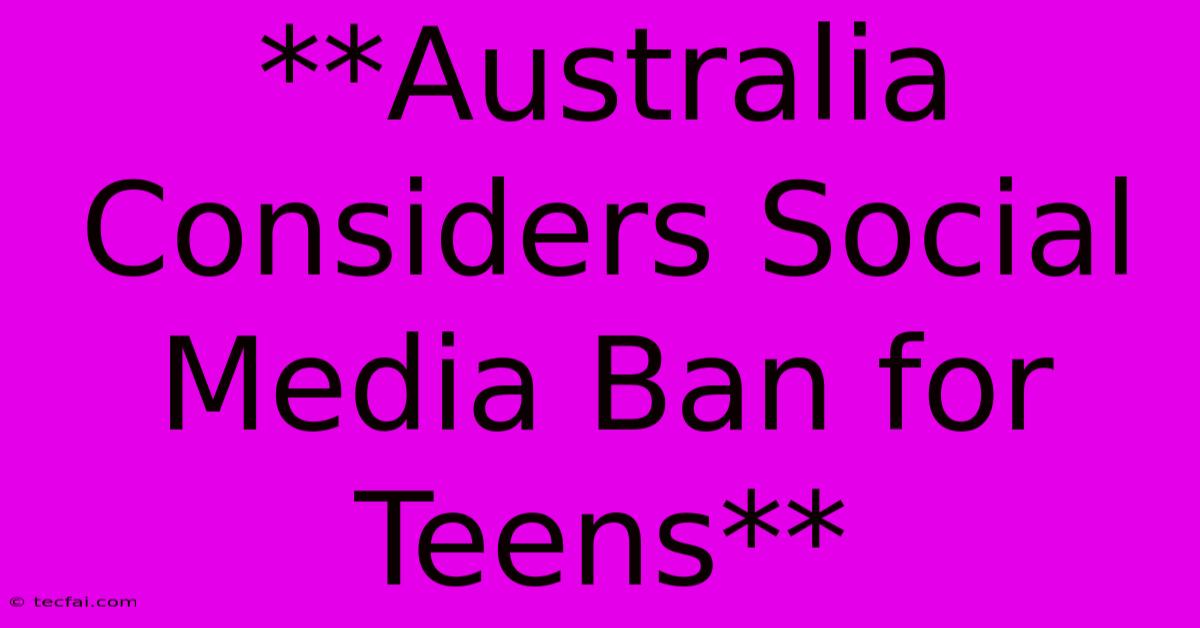**Australia Considers Social Media Ban For Teens**

Discover more detailed and exciting information on our website. Click the link below to start your adventure: Visit Best Website tecfai.com. Don't miss out!
Table of Contents
Australia Considers Social Media Ban for Teens: A Controversial Move
Australia is grappling with a complex issue: the impact of social media on the mental health of teenagers. In response to growing concerns, the Australian government is considering a social media ban for teens under the age of 16. This proposal has sparked a heated debate, raising questions about parental rights, freedom of expression, and the potential benefits and drawbacks of such a drastic measure.
The Concerns Fueling the Debate
The potential ban stems from mounting evidence linking excessive social media use to increased anxiety, depression, and body image issues among young people. Studies have shown that:
- Constant comparison: Social media platforms often present curated versions of reality, leading teenagers to feel inadequate and anxious about their own lives.
- Cyberbullying: The anonymity offered by online platforms can embolden bullies, leading to increased cyberbullying incidents and negative impacts on mental well-being.
- Addiction and Sleep Disruption: The constant notifications and addictive nature of social media can disrupt sleep patterns, leading to fatigue and decreased academic performance.
These concerns have led many parents and educators to advocate for stricter regulations to protect young minds from the potential harms of social media.
Arguments For and Against the Ban
The proposed social media ban for teens has generated strong opinions on both sides:
Supporters of the ban argue:
- Protecting vulnerable minds: Teenagers are still developing their sense of self and are particularly susceptible to the pressures of social media. A ban would create a buffer zone, allowing them to focus on real-life interactions and personal growth.
- Promoting healthy habits: Restricting social media access could encourage teenagers to engage in more offline activities like sports, hobbies, and social interactions, promoting a healthier balance in their lives.
Opponents of the ban argue:
- Infringement on freedom of expression: A ban would restrict teenagers' access to information, communication tools, and platforms for self-expression. It could also stifle creativity and innovation in the digital space.
- Lack of evidence: While social media can have negative impacts, there is no definitive evidence proving a direct causal link between social media use and mental health issues. Focusing on parental guidance and responsible use may be more effective than outright bans.
- Difficult to implement: Enforcing a ban would be challenging and could lead to unintended consequences, such as teenagers accessing social media through other means or using VPNs to bypass restrictions.
The Road Ahead
The Australian government's proposal is currently under review, and it is unclear whether it will be implemented. This debate is a complex one, with no easy answers. It raises important questions about balancing parental rights with teenagers' freedom and the role of technology in modern society.
Moving forward, it's crucial to:
- Foster open dialogue: Encourage open communication between parents, educators, and teenagers about the potential benefits and risks of social media.
- Promote responsible use: Educate teenagers about online safety, responsible social media etiquette, and the importance of digital well-being.
- Focus on parental involvement: Empower parents to set boundaries and monitor their children's social media use, fostering healthy habits and promoting open communication about online experiences.
Ultimately, finding a balance between protecting teenagers from potential harms and allowing them to navigate the digital world responsibly is a challenge that requires a nuanced and multifaceted approach. This ongoing discussion will continue to shape how we think about social media and its impact on young people in the years to come.

Thank you for visiting our website wich cover about **Australia Considers Social Media Ban For Teens**. We hope the information provided has been useful to you. Feel free to contact us if you have any questions or need further assistance. See you next time and dont miss to bookmark.
Featured Posts
-
Trump Victory Market Gains But Concerns Grow
Nov 07, 2024
-
Metal In Bread Recall In Ontario Quebec Newfoundland
Nov 07, 2024
-
Biden Congratulates Trump Sets Meeting
Nov 07, 2024
-
Champions League Alcohol Ban For Arsenal Fans In Milan
Nov 07, 2024
-
Review Christy Browns Self Portrait
Nov 07, 2024
